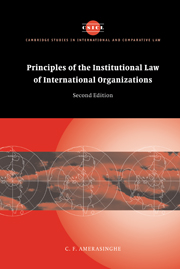Book contents
- Frontmatter
- Contents
- Preface
- List of abbreviations
- Table of cases
- 1 Introduction
- 2 Interpretation of texts
- 3 Legal personality
- 4 Membership and representation
- 5 Non-Judicial organs of organizations
- 6 Acts of non-judicial organs: their legal effect
- 7 Acts of non-judicial organs: the doctrine of ultra vires
- 8 Judicial organs
- 9 The internal law: employment relations
- 10 Privileges and immunities
- 11 Financing
- 12 Responsibility to and of international organizations
- 13 The liability of member states vis-à-vis third parties
- 14 Amendment of constitutions
- 15 Dissolution and succession
- 16 The settlement of disputes
- Index
- Cambridge Studies in International and Comparative Law
14 - Amendment of constitutions
Published online by Cambridge University Press: 10 December 2009
- Frontmatter
- Contents
- Preface
- List of abbreviations
- Table of cases
- 1 Introduction
- 2 Interpretation of texts
- 3 Legal personality
- 4 Membership and representation
- 5 Non-Judicial organs of organizations
- 6 Acts of non-judicial organs: their legal effect
- 7 Acts of non-judicial organs: the doctrine of ultra vires
- 8 Judicial organs
- 9 The internal law: employment relations
- 10 Privileges and immunities
- 11 Financing
- 12 Responsibility to and of international organizations
- 13 The liability of member states vis-à-vis third parties
- 14 Amendment of constitutions
- 15 Dissolution and succession
- 16 The settlement of disputes
- Index
- Cambridge Studies in International and Comparative Law
Summary
Constitutions of international organizations, being organic instruments, may require change both in the light of experience in the organizations as well as in order to keep pace with developments in international society. Changing needs and circumstances may demand appropriate adaptations in the structure, functions and procedures of such organizations. The UN has amended its Charter several times. Articles 23, 27 and 61, relating to the composition of the SC and the ECOSOC, were amended in 1963 (the amendments entering into force in 1965). The membership of the SC was increased from eleven to fifteen and that of the ECOSOC from eighteen to twenty-seven. Again in 1971 the membership of the ECOSOC was increased from twenty-seven to fifty-four by an amendment of Article 61 (the amendment entering into force in 1973). Article 109 of the UN Charter relating to the review conference was amended in 1965 (the amendment entering into force in 1968). Between 1945 and 1966 the thirteen specialized agencies of the UN and the IAEA adopted sixty-one amendments to their constitutions all of which have come into force. The FAO had twenty-five, the UNESCO fourteen, the ICAO and the ILO five each, the WMO four, the IFC, the IMCO and the WHO two each, the IBRD and the IAEA one each and the IMF and the IDA none. Between 1966 and 1995 the IMF had adopted and brought into effect three amendments.
- Type
- Chapter
- Information
- Publisher: Cambridge University PressPrint publication year: 2005

